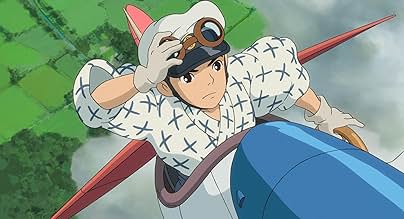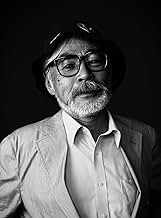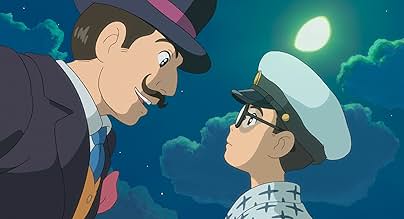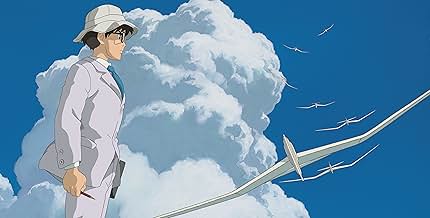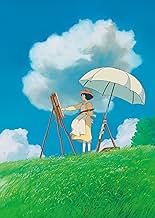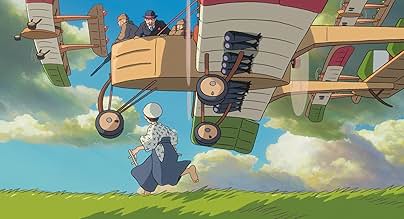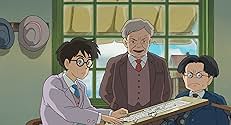Una mirada a la vida de Jiro Horikoshi, el hombre que diseñó los aviones de combate japoneses durante la Segunda Guerra Mundial.Una mirada a la vida de Jiro Horikoshi, el hombre que diseñó los aviones de combate japoneses durante la Segunda Guerra Mundial.Una mirada a la vida de Jiro Horikoshi, el hombre que diseñó los aviones de combate japoneses durante la Segunda Guerra Mundial.
- Nominado a 1 premio Óscar
- 26 premios ganados y 54 nominaciones en total
Jun Kunimura
- Hattori
- (voz)
Stephen Alpert
- Castorp
- (voz)
- (as Steve Alpert)
Morio Kazama
- Satomi
- (voz)
Joseph Gordon-Levitt
- Jirô Horikoshi
- (English version)
- (voz)
John Krasinski
- Honjô
- (English version)
- (voz)
Emily Blunt
- Nahoko Satomi
- (English version)
- (voz)
Martin Short
- Kurokawa
- (English version)
- (voz)
Stanley Tucci
- Caproni
- (English version)
- (voz)
Mandy Patinkin
- Hattori
- (English version)
- (voz)
Mae Whitman
- Kayo Horikoshi
- (English version)
- (voz)
- …
Opiniones destacadas
This film is totally different from Miyazaki's other films and I personally think, like what he's mentioned, a message to to world about how he looks at the war, war machines , peace, love and living. As I am a Taiwanese, who has once colonized and ruled by Japanese during the second world war, how Japanese coped with the war topic is always sensitive. However, what I saw in this film is truly reflecting that Miyazaki is peace loving and his point of view on war, life and love. He depicted about the beauty of dreams and surviving. You can see that everyone in this film try every hard to live, even though the time is hard and forced to strike a balance between dreams and reality. However, they are self fulfilling. So who is to blame? who ruined their lives and dreams? Those who leads them to the war to blame.
In short, the film perfectly shows how the director's been telling in almost every his masterpiece but in a personally way, to the audience. Just like a final message he would like yo transmit to the world. I felt overwhelmed by the film and sad that he decided to retired. Please go to watch this film and you will do feel the courage to live hard and live well.
In short, the film perfectly shows how the director's been telling in almost every his masterpiece but in a personally way, to the audience. Just like a final message he would like yo transmit to the world. I felt overwhelmed by the film and sad that he decided to retired. Please go to watch this film and you will do feel the courage to live hard and live well.
I don't know if I loved it right from minute one, but then it doesn't quite start like any Miyazaki film (well, even with a dream scene). Its a little quieter, more natural, thoughtful and subdued, much like the main character will be through the film. And then earthquake hits. Its unlike anything you've seen in an animated film. It doesn't hype up its suspense or action. it simply shows Its protagonist, Jiro, react to a situation as calm and controlled as possible amid the debris and darkness and chaos, and help a couple of people in need. of course he doesn't know this young woman he saves will be an emotional foundation for his life. But as with any simple but splendid poetry we have a sense of the connection made.
Any other director might just make it a film about the 1920s earthquake that devastated Tokyo. Not Miyazaki. Soon after Tokyo is up and running and Jiro is after his passion which is airplanes. He dreams about them, and more than that dreams about the Italian icon of flying he looks up to as he gives Jiro advice and philosophical points about flying, inspiration and technology. And very soon after the film is more than anything about this man and his process - finding without any grandiose strokes what can make a plane fly quicker, faster, safer, with more agility and s look like no other. And, sometime soon, finding a love all his own.
Miyazaki has said (once again but probably for real this time) that he is done making films with the conclusion of the Wind Rises. If so, that's fine. I'm not sure if it's any sort of culmination of what his career has been or what he's said - Though you could certainly have a double feature with Porco Rosso, also about the wonder of flight but more in an adventure fantasy approach and have a fantastic several hours - and yet it's no less a marvel than anything else he's made. And if anything it just reveals more depths to how he feels for people and can show them in dimensions on screen than ever before. It is a biopic still, and a line here or there may be cornball, but so what. Its a fiercely intelligent film with genuine sentiment and a grace that comes from being a master letting your story unfold without rushing, letting scenes play out for full emotional weight, And ample colors and compositions painted with nostalgia for a mood (if not necessarily a side in history).
And yet you may think going in that there will be some sort of agenda politically speaking as it looks at a man who helped, ultimately, design planes that dropped bombs and shot and killed the US during world war two. It really isn't, or as simple as that. A couple of scenes with a German businessman of a sort voiced by Werner Herzog (yes the one and only, you'll know him when you hear him) lays out the futility in war and conflicts. And Jiro agrees. when someone speaks to him about what planes will be sent to fight whom, he is already resigned. "Japan will burn,' he says more or less. And yet he always stays more pragmatic, more about the work and the hard enough task to make the planes and make them fly high and well. This double edged sword also comes out when he is talking to his Italian guru in his dreams (especially the last one at the end of the war).
With all of this, the Wind Rises is a touching love story that seems possibly very doomed from the start - before getting engaged Jiro is told by Nahoko she has Tuberculosis and he doesn't care, or at least about that deterring him away - and how strong their bond is. How often do we get to see people in a movie, animated or otherwise, act like this to one another with kindness and compassion and a tenderness that (for the most part, maybe there's a bit of that "Japanese Disney" schmaltz but not much) is without any reservation? Not often really, at least like this as told at times without words at all; the high point of the picture is when there is a kind of wordless courtship as Jiro flies a paper plane around and it goes to the girl and she flies it back out as he chase to catch it and it repeats. The moving music, the amiable tone of the whole set piece, the mild peril... I'm at a loss to how much that just works because it feels true.
Did I mention its among the ten most beautifully animated films ever made? And I'm sure that group includes Mononoke and Totoro already. And I know full well a term like 'beautiful" is overused and tired. But Miyazaki crafts his works (or did) by hand with gorgeous, clear lines, water colors and maybe some cgi, and it both serves the story and its own sense of the world it's in: the earthy greens, the shiny clouds and blue skies, the metallic force of the planes, the drab grays of the offices and plane hangers. And yet you are still wrapped up in the tale of this man and those who cared about him or were inspired by and led by him, and is another rarity (easier to pull off in literature, trickier here and Miyzaki just about pulls it off): a mild wind that grows with power and energy, briefly, and then ebbs and flows with reality and, again, thought.
Any other director might just make it a film about the 1920s earthquake that devastated Tokyo. Not Miyazaki. Soon after Tokyo is up and running and Jiro is after his passion which is airplanes. He dreams about them, and more than that dreams about the Italian icon of flying he looks up to as he gives Jiro advice and philosophical points about flying, inspiration and technology. And very soon after the film is more than anything about this man and his process - finding without any grandiose strokes what can make a plane fly quicker, faster, safer, with more agility and s look like no other. And, sometime soon, finding a love all his own.
Miyazaki has said (once again but probably for real this time) that he is done making films with the conclusion of the Wind Rises. If so, that's fine. I'm not sure if it's any sort of culmination of what his career has been or what he's said - Though you could certainly have a double feature with Porco Rosso, also about the wonder of flight but more in an adventure fantasy approach and have a fantastic several hours - and yet it's no less a marvel than anything else he's made. And if anything it just reveals more depths to how he feels for people and can show them in dimensions on screen than ever before. It is a biopic still, and a line here or there may be cornball, but so what. Its a fiercely intelligent film with genuine sentiment and a grace that comes from being a master letting your story unfold without rushing, letting scenes play out for full emotional weight, And ample colors and compositions painted with nostalgia for a mood (if not necessarily a side in history).
And yet you may think going in that there will be some sort of agenda politically speaking as it looks at a man who helped, ultimately, design planes that dropped bombs and shot and killed the US during world war two. It really isn't, or as simple as that. A couple of scenes with a German businessman of a sort voiced by Werner Herzog (yes the one and only, you'll know him when you hear him) lays out the futility in war and conflicts. And Jiro agrees. when someone speaks to him about what planes will be sent to fight whom, he is already resigned. "Japan will burn,' he says more or less. And yet he always stays more pragmatic, more about the work and the hard enough task to make the planes and make them fly high and well. This double edged sword also comes out when he is talking to his Italian guru in his dreams (especially the last one at the end of the war).
With all of this, the Wind Rises is a touching love story that seems possibly very doomed from the start - before getting engaged Jiro is told by Nahoko she has Tuberculosis and he doesn't care, or at least about that deterring him away - and how strong their bond is. How often do we get to see people in a movie, animated or otherwise, act like this to one another with kindness and compassion and a tenderness that (for the most part, maybe there's a bit of that "Japanese Disney" schmaltz but not much) is without any reservation? Not often really, at least like this as told at times without words at all; the high point of the picture is when there is a kind of wordless courtship as Jiro flies a paper plane around and it goes to the girl and she flies it back out as he chase to catch it and it repeats. The moving music, the amiable tone of the whole set piece, the mild peril... I'm at a loss to how much that just works because it feels true.
Did I mention its among the ten most beautifully animated films ever made? And I'm sure that group includes Mononoke and Totoro already. And I know full well a term like 'beautiful" is overused and tired. But Miyazaki crafts his works (or did) by hand with gorgeous, clear lines, water colors and maybe some cgi, and it both serves the story and its own sense of the world it's in: the earthy greens, the shiny clouds and blue skies, the metallic force of the planes, the drab grays of the offices and plane hangers. And yet you are still wrapped up in the tale of this man and those who cared about him or were inspired by and led by him, and is another rarity (easier to pull off in literature, trickier here and Miyzaki just about pulls it off): a mild wind that grows with power and energy, briefly, and then ebbs and flows with reality and, again, thought.
Miyazaki's swan song, most likely. It's an animated biopic of Jiro Horikoshi, a Japanese aircraft engineer who developed the Zero, the plane which would eventually bomb Pearl Harbor and do kamikaze attacks in WWII. The man himself was a pacifist (at least according to this film). Most of the film just deals with the man's love for flight, which obviously makes the story very dear to Miyazaki. In fact, a good portion of the film takes place in Horikoshi's dreams, where he can invent any crazy contraption. First and foremost, the film is gorgeous. Though it mostly deals with the real world, it finds the beauty in it. As good as the film is, it isn't one of Miyazaki's best. It's a little long-winded and slow (definitely don't take your kids to it, even if they're big Ghibli fans). Miyazaki kind of neuters the militaristic history of Japan at that time. You can feel some terrible stuff going on in the background, but, outside of the Germans, whom our hero visits at one point, all the characters whom we meet are perfectly nice people. I would have liked a more detailed picture of history at the time. Also, the romance that is depicted in the film, which is entirely invented, is a tad too maudlin (though it is quite nice up front). And, though I won't hold it against the film itself, the English language dub is awful. This may be due to the film's specific, Japanese setting, but I really felt the voice actors were just dull as Hell. I hate to say it, but Joseph Gordon-Levitt in the lead role is the worst. The least offensive performances come from Martin Short and Mae Whitman (the latter is a professional voice actress who is great on Avatar: The Last Airbender, though she is best known for her role as Michael Cera's dull girlfriend Ann on Arrested Development). I wish I had just seen the subtitled version instead (it was playing here, but at an inconvenient theater). I might like the film better seeing it subtitled. All those criticisms don't amount to too much, though. It's a wonderful film.
"The Wind Rises" is a highly fictionalized version of the early years of aeronautical engineers Jiro Hirokoshi and Tatsuo Hori...with a very strong emphasis on Jiro. The fact Hiyao Miyazaki would make such a film isn't all that surprising, since he seemed to have a real sentimental attitude towards early airplanes in several of his films (such as "Porco Rosso"). However, I was a bit surprised when I learned about the film since the planes these two men made for Mitsubishi were important components of the extremely nationalistic Japanese military of the 1930s and 40s...an era many would probably choose to forget.
Not surprisingly, this is a Miyazaki film that is not at all intended for children. In fact, I wouldn't bother showing it to your younger audiences...they'd be bored. Plus some parents would object to all the smoking and cursing...and there's not a single Totoro or flying witch to be seen! As for me, I understand that many Japanese animated films are NOT intended for kids and that isn't a bad thing at all. In this case, Studio Ghibli managed to make one of the loveliest of all their films in "The Wind Rises". It is extremely touching in parts, especially when dealing with Jiro's fated romance. In fact, the film practically screams quality throughout and it's not at all surprising that it was nominated for the Best Animated Feature Oscar. Well worth seeing.
Incidentally, Jiro's infamous Japanese Zero was interesting because by the end of the war almost every single one of these aircraft had been destroyed...and I wonder how he felt about this. Ironically, one of the few Zeros to survive did so because it was captured and taken to the States for testing and evaluation.
Not surprisingly, this is a Miyazaki film that is not at all intended for children. In fact, I wouldn't bother showing it to your younger audiences...they'd be bored. Plus some parents would object to all the smoking and cursing...and there's not a single Totoro or flying witch to be seen! As for me, I understand that many Japanese animated films are NOT intended for kids and that isn't a bad thing at all. In this case, Studio Ghibli managed to make one of the loveliest of all their films in "The Wind Rises". It is extremely touching in parts, especially when dealing with Jiro's fated romance. In fact, the film practically screams quality throughout and it's not at all surprising that it was nominated for the Best Animated Feature Oscar. Well worth seeing.
Incidentally, Jiro's infamous Japanese Zero was interesting because by the end of the war almost every single one of these aircraft had been destroyed...and I wonder how he felt about this. Ironically, one of the few Zeros to survive did so because it was captured and taken to the States for testing and evaluation.
The announcement of this film was a pleasant surprise after Ponyo and From Up on Poppy Hill, which both had simple, childish plots. Few films in Japan have tackled the lives of imperial period heroes; the ghosts of the 1960s urge people to denounce what really happened in that time and memorialize an imaginary anti-war movement, for example in this year's film "Shounen H". For Miyazaki to choose a subject like this showed that he was really going for a huge challenge. Miyazaki is of course anti-war and environmentalist. But Ghibli films are never negative. What sort of positive image of the Zero bomber inventor would Miyazaki produce?
The result is astounding. As everyone has noted, this is not a children's movie. It's complex, so it doesn't have the epic sense of Miyazaki at his best, but history and adulthood are just as complex, and Miyazaki does justice to both. The film indeed stays positive throughout, by showing from start to finish how everyone wishes they themselves would behave, rewarding the viewer with virtue and beauty, but without being condescending about the hardships of real life. In a sense, the film is about the "importance of dreams", but it's also about what it means to be a dreamer in real life, and how our highest fantasies can be turned into beauty if we put our minds to it. The cartoon medium is put to full, extravagant use in dream sequences that merge right into the narrative. Certain elements at the end of the film leave the obvious unsaid in a peculiarly Japanese and fulfilling way. The most classic films of Japan, like the great works of Akira Kurosawa and Yasujiro Ozu, say something profound about the meaning of life, and Kaze Tachinu deserves a place among those ranks.
The result is astounding. As everyone has noted, this is not a children's movie. It's complex, so it doesn't have the epic sense of Miyazaki at his best, but history and adulthood are just as complex, and Miyazaki does justice to both. The film indeed stays positive throughout, by showing from start to finish how everyone wishes they themselves would behave, rewarding the viewer with virtue and beauty, but without being condescending about the hardships of real life. In a sense, the film is about the "importance of dreams", but it's also about what it means to be a dreamer in real life, and how our highest fantasies can be turned into beauty if we put our minds to it. The cartoon medium is put to full, extravagant use in dream sequences that merge right into the narrative. Certain elements at the end of the film leave the obvious unsaid in a peculiarly Japanese and fulfilling way. The most classic films of Japan, like the great works of Akira Kurosawa and Yasujiro Ozu, say something profound about the meaning of life, and Kaze Tachinu deserves a place among those ranks.
¿Sabías que…?
- TriviaHuman voices are largely used as sound effects, such as engine roars and earthquake sounds.
- ErroresAfter Jiro tells Nahoko that he's finished designing his plane, he falls asleep. Nahoko removes his glasses and places them on the floor behind their heads. In the next shot, from behind their heads, there are no glasses on the floor.
- Créditos curiosos[A quote in French from a poem by Paul Valéry that appears as a caption at the start of the movie.] The wind is rising! We must try to live!
- ConexionesEdited into Miyazaki Dreams of Flying (2017)
- Bandas sonorasHikouki-gumo
(Contrails)
Written by Yumi Matsutôya (as Arai Yumi)
Performed by Yumi Matsutôya (as Arai Yumi)
Courtesy of Toshiba EMI (Universal Music Japan)
Selecciones populares
Inicia sesión para calificar y agrega a la lista de videos para obtener recomendaciones personalizadas
Detalles
- Fecha de lanzamiento
- País de origen
- Sitios oficiales
- Idiomas
- También se conoce como
- The Wind Rises
- Productoras
- Ver más créditos de la compañía en IMDbPro
Taquilla
- Presupuesto
- USD 30,000,000 (estimado)
- Total en EE. UU. y Canadá
- USD 5,209,580
- Fin de semana de estreno en EE. UU. y Canadá
- USD 313,751
- 23 feb 2014
- Total a nivel mundial
- USD 137,091,048
- Tiempo de ejecución
- 2h 6min(126 min)
- Color
Contribuir a esta página
Sugiere una edición o agrega el contenido que falta







